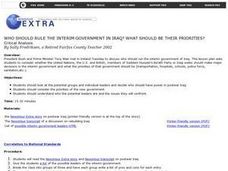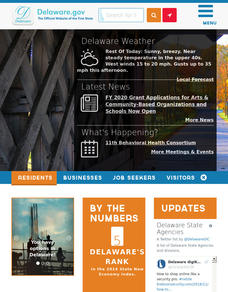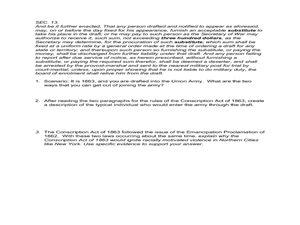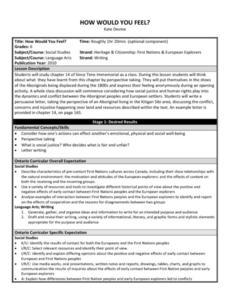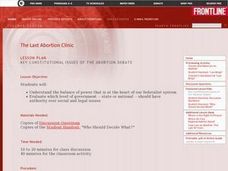Curated OER
How Does Government Secure Natural Rights?
Students explain why a government with a constitution is not necessarily a constitutional government, and identify alternative models of government that the Founders had to choose from.
Curated OER
Government for the People
Seventh graders read about the three branches, the balance of power an the system of checks and balances. They analyze current events in terms of which vranch of government is responsible for addressing issues. Students create a poster...
Curated OER
Local government, local needs
Students use an investigative approach to extend knowledge about local government. Students develop an understanding of relationship between local needs and government services. Students work in small groups to collect, interpret and...
Curated OER
Levels of Government in California
Fourth graders examine problems and determine the appropriate level of government to deal with the problem. They identify their local, state and federal elected officials
Curated OER
Montana Reservation Governments
Third graders examine the types of governments on Indian reservations. In groups, they research the responsibilities of local and tribal governments. As a class, they discuss how the state of Montana meets the needs of its citizens...
Curated OER
Why Do We Need a Government?
Students are introduced to the basic concepts of the natural rights philosophy. After being introduced to the concept of natural rights, students are asked to speculate on what might be the benefits and problems of living in a state of...
Curated OER
Is Bureaucracy Bad?
Students examine the term bureaucracy and its role in state government. They study the purpose of regulations and explain the role of regulatory agencies in South Carolina. They describe how administrators act as law makers and analyze...
Curated OER
Dialing into Government Knowledge
Students read about the services provided by the different levels of the government.
Curated OER
Who Should Rule the Interim Government in Iraq?
Students study the concept of an Interim Government in Iraq and propose possible leadership options.
Curated OER
Sectors? What Sectors?
Students develop a list why water is an endangered natural resource. They identify four sectors in society. They explain the responsibilities that each sector plays in conserving water.
Curated OER
Creating Professional Awareness: What I Discovered At The Teachers' Institute On Canadian Parliamentary Democracy
Students do research about the Canadian government and become aware of all the resources available to them.
Curated OER
History of Congress and Government
Seventh graders will perform research that helps them to learn about government and the democratic way of life. This form of life serves as a basis of reflection for the basic forms of life on earth.
Curated OER
3 Branches of Governement
Sixth graders use the "Making the Grade" books, citizenship packets, and the "Ben's Guide" website to create a poster and a report on their assigned government branch. They then present their poster and report to their classmates.
Curated OER
Forming A Government
Young scholars simulate being on an island after their ship has wrecked, or their plane has crashed. Food, fresh water, and shelter are in short supply. They must form a government, develop laws and penalties.
Curated OER
Why is Delaware Called "The First State"?
High schoolers learn why Delaware is called the First State and the background leading to Delaware's ratification of the US Constitution. Students, in groups, choose an individual in today's world that has the greatest influence on their...
Curated OER
Lesson I - Why is Delaware Called "The First State"?
Students discuss why Delaware is called the First State, research background leading to Delaware's ratification of United States Constitution, complete worksheet on United States Constitution, and work in groups to choose an individual...
Curated OER
Social Studies: Jeffeerson and the Declaration
Students investigate Thomas Jefferson's intentions for the Declaration of Independence. In discussion, they consider what parts of the document are most useful today and to what purposes does it address the most. Finally, students...
Curated OER
What We Leave Behind
Students analyze primary source documents from the 1830's. They examine how records, memoirs and artifacts preserve history and discuss what should be placed in a time capsule for future generations.
Curated OER
Is All Fair In War?
Students read the 1755 Bounty Proclamation and discuss what happened in Maine during this time period. With a partner, they use the text and dictionary to look up any word they do not know. They participate in a think, pair, share to...
Curated OER
What Really Caused This?
In this primary source analysis worksheet, high schoolers read a copy of the Conscription Act of 1863 and respond to 7 short answer questions about its content. The text of the act is not included.
Curated OER
How Would You Feel?
Sixth graders put themselves in the shoes of aborigines who were displaced from their homes in the 1800s by Europeans who came in and took their land from them. They discuss the social injustices suffered by these people, and write a...
Curated OER
The Last Abortion Clinic: Key Constitutional Issues of the Abortion Debate
Students discuss the Constitution of the United States and its amendments, then apply this discussion by creating a "Who should Decide What?" list, based upon their ideas about whether controversial issues such as abortion and medical...
Curated OER
We the People: Promise and Practice in our Constitution
Students examine the concept that the constitutional government guarantees that our government is not all-powerful and analyze the purposes of our government that are listed in the Preamble. They assess that equality under the law and...
Curated OER
Cartoons for the Classroom: Sunshine Week
In this current events worksheet, students analyze a political cartoon about sunshine week and open government and respond to 3 talking point questions.










